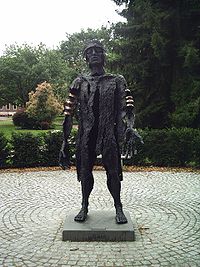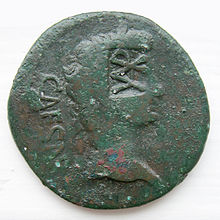- Publius Quinctilius Varus
-
"Varus" redirects here. For other uses, see Varus (disambiguation).
Publius Quinctilius Varus (46 BC in Cremona, Roman Republic – AD 9 in Germania) was a Roman politician and general under Emperor Augustus, mainly remembered for having lost three Roman legions and his own life when attacked by Germanic leader Arminius in the Battle of the Teutoburg Forest.
Contents
Life
His paternal grandfather was senator Sextus Quinctilius Varus. Varus was a patrician, born to an aristocratic but long-impoverished and unimportant family in the Quinctilia gens. His mother was a daughter from consul Gaius Claudius Marcellus Minor's first marriage. His father was Sextus Quinctilius Varus, a senator aligned with the conservative republicans in the civil war against Julius Caesar. Sextus survived their defeat, but it is unknown whether he was involved in Caesar's assassination. He committed suicide after the Battle of Philippi (42 BC).
Despite his father's political allegiances, Varus became a supporter of Caesar's heir, Octavian, later known as Augustus. About 14 BC he married Vipsania Marcella, the daughter of Marcus Vipsanius Agrippa and Claudia Marcella Major and became a personal friend of both Agrippa and Augustus. Vipsania Marcella was a grandniece of Augustus. When Agrippa died, it was Varus who delivered the funeral eulogy. Thus, his political career was boosted and his cursus honorum finished as early as 13 BC, when he was elected consul junior partner of Tiberius, Augustus' stepson and future emperor.
Political career
Between 9 and 8 BC, following the consulship, Varus was governor of the province of Africa. After this, he went to govern Syria, with four legions under his command. When he was governing Syria, he was known for his harsh rule and high taxes. The Jewish historian Josephus mentions the swift action of Varus against a messianic revolt in Judaea after the death of Rome's client king Herod the Great in 4 BC. After occupying Jerusalem, he crucified 2000 Jewish rebels, and may have thus been one of the prime objects of popular anti-Roman sentiment in Judaea, for Josephus, who made every effort to reconcile the Jewish people to Roman rule, felt it necessary to point out how lenient this judicial massacre had been. Indeed, at precisely this moment, the Jews, nearly en masse, began a full-scale boycott of Roman pottery (Red Slip Ware). [1] Thus, the archaeological record seems to verify mass popular protest against Rome because of Varus' cruelty.
Following the governorship of Syria, Varus returned to Rome and remained there for the next few years. Following his first wife's death, he married Claudia Pulchra, daughter of Claudia Marcella Minor (daughter of consul Gaius Claudius Marcellus Minor and Octavia Minor, elder sister of Augustus) and consul Aemilius Lepidus Paullus (nephew of Triumvir Marcus Aemilius Lepidus). She was a great niece of Augustus, which shows that Varus still enjoyed political favour. They had a son, Quinctilius Varus.
In the first years of the 1st century, Tiberius, his brother Drusus, and Germanicus conducted a long campaign in Germania, the area north of the Upper Danube and east of the Rhine, in an attempt at a further major expansion of the Empire's frontiers, and a shortening of its frontier line. They subdued several Germanic tribes, such as the Cherusci. In AD 7, the region was declared pacified and Varus was appointed to govern Germania. Tiberius, who would later succeed Augustus as Emperor, left the region to deal with the Great Illyrian Revolt.
Battle of the Teutoburg Forest
Main article: Battle of the Teutoburg ForestIn 9 AD, Varus had stationed his armies near the Weser River with his three legions, the Seventeenth, the Eighteenth and the Nineteenth, when news arrived of a growing revolt in the Rhine area to the west. Despite a warning from Segestes, Varus trusted Arminius, the man who appealed for his help, because he was a Romanised Germanic prince and commander of an auxiliary cavalry unit.
Not only was Varus' trust in Arminius a terrible misjudgement, but Varus compounded it by placing his legions in a position where their fighting strengths would be minimized and that of the Germanic tribesmen maximized. Arminius and the Cherusci tribe, along with other allies, had skilfully laid an ambush, and in the Battle of the Teutoburg Forest in September (east of modern Osnabrück), the Romans marched right into it.
The heavily forested, swampy terrain made the infantry manoeuvres of the legions impossible to execute and allowed the Germanic fighters to defeat the legions in detail. On the third day of fighting, the Germans overwhelmed the Romans at Kalkriese Hill, north of Osnabrück. Accounts of the defeat are scarce, due to the totality of the defeat, but one account tells of some Roman cavalry which abandoned the infantry they were supposed to be supporting and fled to the Rhine, but were intercepted by the Germanic tribesmen and killed. Some captured Romans were placed inside wicker cages and burned alive (see Edward Gibbon); others were enslaved or ransomed. Tacitus reports that the victorious Germanic tribes sacrificed captive officers to their gods on altars that could still be seen years later. Varus himself, upon seeing all hope was lost, committed suicide (see Bunson, A Dictionary of the Roman Empire). Arminius cut off his head and sent it to Bohemia as a present to King Marbod of the Marcomanni, the other most important Germanic leader, whom Arminius wanted to coax into an alliance, but Marbod declined the offer and sent the head on to Rome for burial. The Romans did later recover the lost legions' eagles (see Edward Gibbon), two of them in 15 AD – 16 AD, the third in 42 AD. See Battle of the Teutoburg Forest. The Romans ultimately never succeeded in putting the north and east of Germany under direct Roman rule as were the regions on the Rhine, the Danube, and the Agri Decumates.
So great was the shame, and the ill luck thought to adhere to the numbers of the Legions, that XVII, XVIII and XIX never again appear in the Roman Army's order of battle. The Battle of the Teutoburg Forest was keenly felt by Augustus, darkening his remaining years. According to the biographer Suetonius, upon hearing the news, Augustus tore his clothes, refused to cut his hair for months and, for years afterwards, was heard, upon occasion, to moan, "Quinctilius Varus, give me back my Legions!" ("Quintili Vare, legiones redde!").[2] Gibbon describes Augustus' reaction to the defeat as one of the few times the normally stoic ruler lost his composure.
In fiction
- I, Claudius (1934) by Robert Graves, a novelization of the reigns of the first four emperors. Varus does not actually appear in the novel, but his defeat by the Germans is an important event.
- The Iron Hand of Mars (1994) by Lindsey Davis; fourth book of the mystery series set during the reign of Vespasian, a portion of the novel occurs in the Teutoburger Wald.
- Give Me Back My Legions! (2009) by Harry Turtledove, which details the events leading up to the battle, including a great deal of background information on Varus himself.
See also
- Quinctilia (gens)
References
- The Battle That Stopped Rome: Emperor Augustus, Arminius, and the Slaughter of the Legions in the Teutoburg Forest by Peter S. Wells, W. W. Norton & Company, October 2003, ISBN 0393020282, ISBN 978-0393020281
- Rome's Greatest Defeat: Massacre in the Teutoburg Forest (Hardcover) by Adrian Murdoch, Hardcover: 256 pages, Publisher: Sutton Publishing (June 14, 2006), ISBN 0750940158, ISBN 978-0750940153
- The Twelve Caesars, Suetonius, translated by Robert Graves, 1957, Penguin Books; Also available from Project Gutenberg: The Lives of the Twelve Caesars, Complete
- A Roman Encyclopedia by Matthew Bunson, 1995 Oxford Paperback Reference
- The Decline and Fall of the Roman Empire by Edward Gibbon, Modern Library
- Annals by Tacitus (various editions). Summarizes reports of later Romans who found the battlefield.
- Compendium of Roman History (Res gestae divi Augusti) by Velleius Paterculus, Harvard University Press; 1924. Brief mention of the Varus Disaster by the author, who was serving as a staff officer with Tiberius in Pannonia at the time.
External links
- Varusbattle in Netherland
- Livius.org: Publius Quinctilius Varus
- Discussion on the meaning of the "VAR" countermark
- Arminius / Varus. The Battle of the Teutoburg Forest – Internet-Portal „Westfälische Geschichte“, LWL-Institut für westfälische Regionalgeschichte, Münster
Preceded by
Marcus Licinius Crassus Dives and Gnaeus Cornelius LentulusConsul of the Roman Empire
13 BCSucceeded by
Marcus Valerius Messalla Barbatus Appianus and QuiriniusCategories:- 46 BC births
- 9 deaths
- People from Cremona
- Julio-Claudian dynasty
- Ancient Roman military personnel who committed suicide
- Ancient Romans who committed suicide
- Roman governors of Africa
- Roman governors of Syria
- Roman Republican consuls
- Suicides by sharp instrument
- 1st-century BC Romans
- 1st-century Romans
- Quinctilii
Wikimedia Foundation. 2010.


